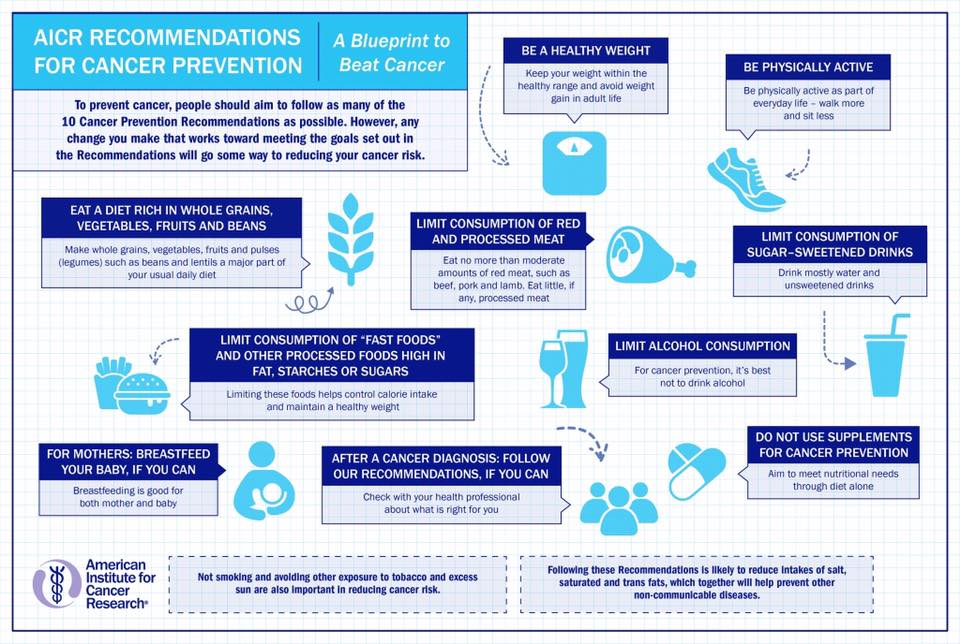This year’s AICR Research Conference was the scene for two-and-a-half days highlighting research that’s helping on many fronts, to move our understanding forward on how to reduce cancer risk and improve cancer survivorship. I was thrilled to give a presentation at this year’s conference, in a session focused on how we can move today’s strongest evidence-based recommendations into “real life” application.

AICR Recommendations as a Blueprint
A blueprint for a building provides a structured plan that can be implemented in a variety of ways to meet individual preferences. Similarly, the key to making the AICR recommendations the foundation of a long-term cancer-preventive lifestyle is to implement them in ways that fit individual needs and lifestyles.
Research shows a sharp contrast in cancer risk between the “Western” eating pattern – featuring large amounts of red and processed meat, refined grains, sweets, and sugar-sweetened beverages – and a healthier plant-focused eating pattern – which includes a variety of vegetables, fruits, whole grains and beans.

- People can make gradual shifts in the “Western” pattern, tweaking portions to give vegetables more real estate on the plate, and switching choices to include more poultry, fish and bean-based dishes instead of daily red and processed meat.
- Create a healthy eating pattern to fit with personal, family and cultural preferences. Some people want to explore more vegetarian approaches to eating, others favor meals that simply increase minimally-processed plant foods. Mediterranean-style eating patterns are one example of this latter approach, but that doesn’t mean eating only Italian or Greek dishes. This pattern keeps the greatest proportion of foods you eat those that offer some health-protective potential. In addition it can help you avoid adult weight gain that can set off a cancer-promoting cascade of metabolic changes.
- For the growing trend of using snacks to replace one or more meals, it means a more careful look at snack choices. These foods must do far more than simply satisfy hunger in order to get the amounts of dietary fiber, whole grains, and antioxidant-supportive plant compounds that seem to protect health. For some people, this can mean more use of leftovers or re-making of leftover ingredients instead of reaching for processed “snack foods”. For others, the key is keeping cabinets and freezer stocked to pull together bowls, salads or plates with high-nutrient choices.
Healthful lifestyles: not all-or-nothing
The AICR recommendations represent a definite call to make changes from typical eating and physical activity patterns, but they are not a call for perfection or extremes. Small steps to shift portions and proportions of food choices can add up to make a difference in lower cancer risk. This allows the development of new tastes, habits and skills that can enhance long-term behavioral change.

- Each day, the average American eats less than one moderate serving of whole grains – such as one slice of bread, a one-ounce serving of ready-to-eat cereal or a half-cup of a cooked whole grain like brown rice or quinoa. For overall health, and lower risk of colorectal cancer, find room to include at least two more of these whole grain servings per day. Most of us don’t need to add more calories to our daily total, so that calls for some kind of shift. Perhaps you’ll eat a bigger bowl of whole- grain cereal in the morning and then don’t need the mid-morning donut. Perhaps a slightly bigger portion of whole grains at dinner means that you can skip the evening snack or are happy with a simple piece of fruit.
- You can meet the recommendation to limit red meat to no more than 12 to 18 ounces a week with four to six portions if you keep them to the three-ounce deck-of-cards size. If you prefer larger portions, then shift perspective and keep it to just two or three times a week. Focus instead on new ways to enjoy other protein-rich options, both animal and plant-based.
Priorities in a Package
Trying to make healthy choices today is all the more confusing amidst headlines that overstate new study findings, and books and blogs that advocate dietary extremes. Misconceptions based on headline hype can give certain foods or drinks an undeserved “health halo”, and the AICR recommendations provide a tool to re-focus on healthful choices.
- Instead of lumping all carbohydrate foods together, prioritize cutting back on sweets and ultra-processed foods (such as chips and bakery). Instead of avoiding all potatoes, focus on limiting the fried and processed forms, reducing mega-size portions of fries or baked potatoes, and increasing vegetable consumption by expanding other choices. If sugar-sweetened beverages are routine, prioritize switching to unsweetened beverages.
- Despite its “health halo”, studies show that although wine may be a cultural part of Mediterranean-style eating patterns, it is not an essential component to links with heart health. In another presentation at the AICR Research Conference, Dr. Elisa Bandera discussed studies that continue to show alcohol-related cancer risk and call into question previous assumptions about alcohol and heart-health.
- Making physical activity part of everyday life is a key part of reducing cancer risk. People often give up because they set goals that are too challenging or don’t see changes in weight that they expect. But even if you don’t see changes on the outside, physical activity as simple as regularly taking a brisk walk brings important protective metabolic changes.
- We all read and hear about hundreds of ways to eat better. Some suggestions have no evidence of support, others much more. The AICR blueprint is a tool for setting priorities because it highlights steps with strong evidence that can make a difference in reducing cancer risk.
As shared in another presentation at the AICR Research Conference, scores indicating lifestyles that more closely fit the package of AICR recommendations are associated with lower cancer risk and better overall health. Instead of scrambling to react to the headlines of the day, people can find a sound foundation in the evidence review and recommendations of the AICR Third Expert Report. Compare your current habits to this blueprint, and use it to identify your individualized priorities for action.





